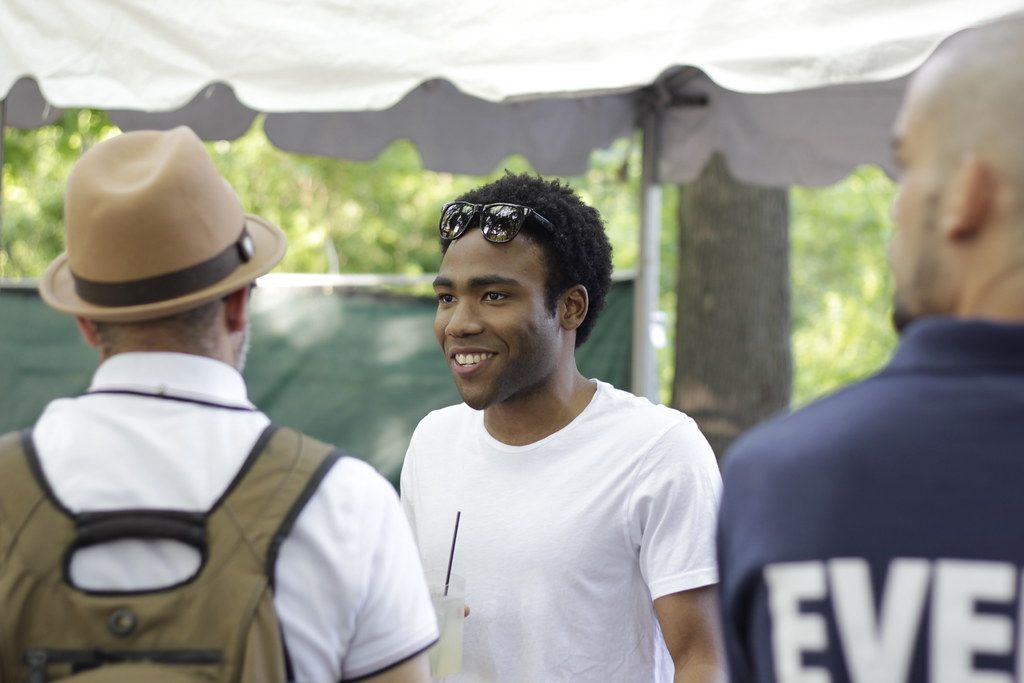No Childish Filmmaker
Donald Glover, the man behind music artist Childish Gambino, has been gradually turning his attention to TV and film in a bid to showcase the variety of his creative talents – but does he have his fingers in too many pies, or is there something to be said for his filmmaking projects?
As a companion-piece to his 2013 album Because the Internet, Glover released short-film Clapping for the Wrong Reasons, his first major collaboration with director and cinematographer Hiro Murai, now an essential part of his filmmaking team. It is a meandering, low-key work, and the dialogue seems improvised at times – it is typical of the mumble-core sub-genre with which Glover’s visual work is now associated. Whilst it might not be his greatest work, Clapping for the Wrong Reasons embodies many key elements of Glover’s unique style. Like his later projects, a lot of interesting details occur below the surface and much goes unexplained. This might be an invitation to look closer or to simply get comfortable with ambiguity – but if there is one consistent theme in Glover’s work, it is a resistance to classification. In any case, his first foray into filmmaking doesn’t reward passive audiences. There are also elements of storytelling in his 2014 project STN MTN / Kauai. The ‘concept album’ features a unified story-line where Glover dreams of ‘running Atlanta’ in the first half, and awakens with a nostalgic longing on the Hawaiian island of Kauai in the second. The tell-tale signs of a good storyteller were there early on in his career.
Glover demonstrates a filmmaking maturity in his focus on the more everyday side of life in the city
The acclaimed television comedy-drama Atlanta is very much his own. He not only stars in it, but serves as writer, executive producer and director (alongside Hiro Murai). It could seem at first that Atlanta over-relies on a similar idea to his 2014 release, and that his success in visual media is dependent on an appeal to music (made most obvious with an appearance from rap trio Migos during the first season). But Atlanta doesn’t merely focus on the musical journey of its protagonists, rather it places more emphasis on elements of horror and even surrealism. Glover himself said that he “just wanted to make Twin Peaks with rappers”. In the episode ‘Teddy Perkins’, Glover departs from his usual comedic style and crafts something more psychologically disturbing, exploring the cost of success in the music industry. He also plays the titular character in white-face – unbeknown even to some members of the crew – adding to the unnerving nature of the episode and proving his ability to perform outside the familiar genre of comedy.
Atlanta presents a vision of a place that has played an ever-increasing role in culture. It has been the making of many important hip-hop artists, from OutKast, Kanye and Playboi Carti to Donald Glover himself. With his history of visual flair, you might be forgiven for expecting to find a more glamorous show in Atlanta, but Glover demonstrates a filmmaking maturity in his focus on the more everyday side of life in the city. This might seem at odds with Atlanta’s unreal elements, but it speaks to the confused, hybrid nature of Atlanta culture. Is it not strange that a once-rebellious genre of music has become simply pop? That a news-cycle could run stories on both Kanye’s debauchery and police brutality? Atlanta, and Glover’s work generally, speaks to these questions and leaves the viewer with the thought that maybe surrealism is the most authentic way to talk about being an African-American right now.
All of Glover’s talents come together for this year’s Guava Island
Glover’s role in Solo displays both his acting and comedic abilities. He had big boots to fill in taking on the character of Lando Calrissian, the loveable playboy of the original trilogy, but his performance was just as entertaining as that of Billy Dee Williams; it felt natural to hear him declare himself as “Captain Lando Calrissian” in his first moments on screen. Glover’s casting was certainly apt, and his charisma adds to an otherwise decent – though not particularly memorable – feature film.
All of Glover’s talents come together for this year’s Guava Island. It’s piloted by many members of the Atlanta team, and Glover himself stars alongside pop superstar Rihanna. As usual, the project blends genres, weaving elements of conspiracy thriller, political satire and comedy into a musical feature, though it’s noticeably lighter in tone and a little more action-packed than Glover’s previous work. For Gambino fans, it also features an interesting rendition of 2018’s ‘This is America’. Guava Island is further proof of Glover’s filmmaking ability and his reluctance to be bound to certain creative industries. He has shown himself to be an important filmmaker whose many talents have allowed him to develop a thoroughly unique style. Alongside Jordan Peele and Boots Riley, he proves that there is no shortage of innovative black voices in Hollywood.
So, go and watch Guava Island. You might be reminded of Glover’s 2016 hit Redbone and its chorus. Stay woke.

Comments